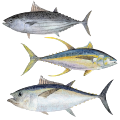Abstract
Taxonomic identification of food is a key component to the correct implementation of traceability pipelines during fish processing. Genetic methods have increased exponentially our discrimination power at the species level. In this context, sustainable management of tuna fisheries can clearly profit from the implementation of this kind of quality control procedures, although they are more difficult to implement at the earlier stages of tuna processing, from harvest to the arrival of fish landings at a processing plant. Here we provide a case study using tuna landings to a processing plant in Cabo Verde, an important small island developing State, which supplies mainly the European Union region. Using DNA sequencing based species identification of tissue samples, we found a taxonomic miss-assignment of species identity in 33% of the individuals in the three target tuna species, Bigeye (Thunus obesus), Yellowfin (Thunus albacares), and Skipjack (Katsuwonus pelamis). More than half of Yellowfin samples were wrongly assigned as bigeyes or skipjacks. We also found that many bigeyes were wrongly assigned as yellowfins or skipjacks. None of the skipjacks were incorrectly assigned. The proportion of Yellowfin samples incorrectly assigned as bigeye was significantly higher than the samples of bigeye incorrectly assigned as yellowfins. These results clearly prove the need for improved traceability processes, which should encompass the whole processing pipeline, from harvesting to the consumer.
